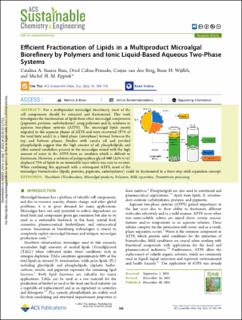Efficient Fractionation of Lipids in a Multiproduct Microalgal Biorefinery by Polymers and Ionic Liquid-Based Aqueous Two-Phase Systems
Ruiz, Catalina A. Suarez; Cabau-Peinado, Oriol; van den Berg, Corjan; Wijffels, Rene Hubertus; Eppink, Michel H.M.
Peer reviewed, Journal article
Published version
Permanent lenke
https://hdl.handle.net/11250/3005016Utgivelsesdato
2021Metadata
Vis full innførselSamlinger
Originalversjon
Ruiz, C. A. S., Cabau-Peinado, O., van den Berg, C., Wijffels, R. H., & Eppink, M. H. M. (2021). Efficient ractionation of lipids in a multiproduct microalgal biorefinery by polymers and ionic liquid-based aqueous two-phase systems. ACS Sustainable Chemistry & Engineering, 10(2), 789-799. doi: 10.1021/acssuschemeng.1c06017Sammendrag
For a multiproduct microalgal biorefinery, most of the cell components should be extracted and fractionated. This work investigates the fractionation of lipids from other microalgal components (pigments, proteins, carbohydrates) using polymers and IL solutions in aqueous two-phase systems (ATPS). The microalgal lipids poorly migrated to the aqueous phases of ATPS and were recovered (97% of the total fatty acids) in a third phase (interphase) formed between the top and bottom phases. Studies with canola oil and purified phospholipids suggest that the high amount of oil, phospholipids, and other natural emulsifiers present in the microalgae mixed with the high amount of water in the ATPS form an emulsion which is difficult to fractionate. However, a solution of polypropylene glycol 400 (25% w/w) displaced 73% of lipids in an immiscible layer which was easy to recover. When combining this approach with a subsequent ATPS, most of the microalgae biomolecules (lipids, proteins, pigments, carbohydrates) could be fractionated in a three-step mild separation concept.

